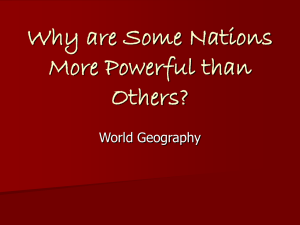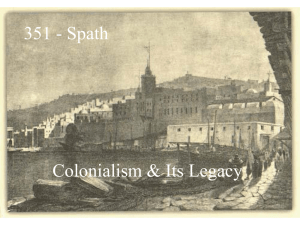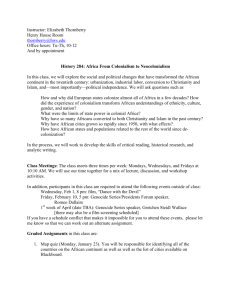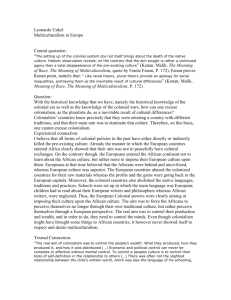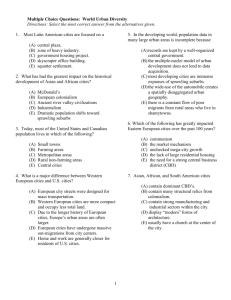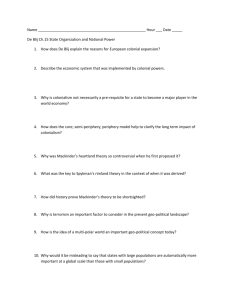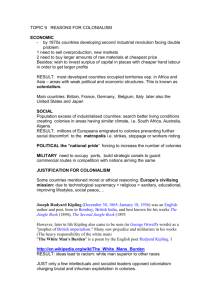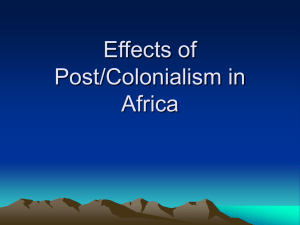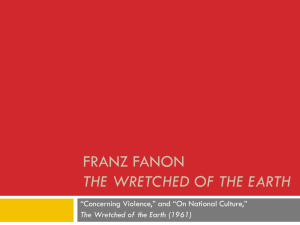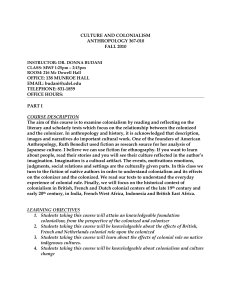13 Fanon 3 (2/4)
advertisement
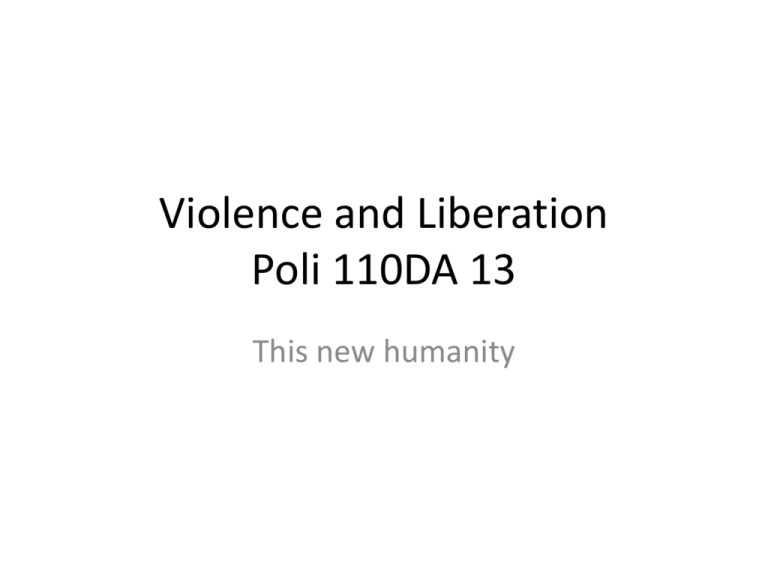
Violence and Liberation Poli 110DA 13 This new humanity • “Political education means opening up the mind, awakening the mind, and introducing it to the world. It is as Césaire said: ‘To invent the souls of men.’” (138) • “To politicize the masses is not and cannot be to make a political speech. It means driving home to the masses that everything depends on them, that if we stagnate the fault is theirs, and that if we progress, they too are responsible, that there is no demiurge, no illustrious man taking responsibility for everything, but that the demiurge is the people and the magic lies in their hands and their hands alone.” (138) • “For us who are determined to break the back of colonialism, our historic mission is to authorize every revolt, every desperate act aborted or drowned in blood.” (146) • Culture is “the fundamental issue of the legitimate claim to a nation.” (146) – The nation-state • “Faced with the colonized intellectuals debunking of the colonist theory of a precolonial barbarism, colonialism’s response is mute. It is especially mute since the ideas put forward by the young colonized intelligentsia are widely accepted by metropolitan specialists.” (147) – Africa – Mexico – Peru • “Some have been surprised by the passion invested by the colonized intellectuals in their defense of a national culture. But those who consider this passion exaggerated are strangely apt to forget that their psyche and their ego are conveniently safeguarded by a French or German culture whose worth has been proven and which has gone unchallenged.” (148) • Colonized intellectuals look to past in order to prevent themselves from vanishing into the European tradition – This hope is motivated by the desire to discover “something beyond the present wretchedness, beyond this self-hatred, this abdication and denial, some magnificent and shining era that redeems us in our own eyes and those of others.” (148) • Egyptian museums • “Colonialism is not satisfied with snaring the people in its net or of draining the colonized brain of any form of substance. With a kind of perverted logic, it turns its attention to the past of the colonized people and distorts it, disfigures it, and destroys it. This effort to demean history prior to colonization today takes on a dialectical significance.” (149) • “Colonialism, little troubled by nuances, has always claimed that the ‘nigger’ was a savage, not an Angolan or a Nigerian, but a ‘nigger.’ For colonialism, this vast continent was a den of savages, infested with superstitions and fanaticism, destined to be despised, cursed by God, a land of cannibals, a land of ‘niggers.’ Colonialism’s condemnation is continental in scale. (150) • “The colonized intellectual, steeped in Western culture and set on proving the existence of his own culture, never does so in the name of Angola or Dahomey. The culture proclaimed is African culture.” – “He is expected to demonstrate the existence of a ‘Negro’ culture.” (150) • Manichaean • Colonized, in response to the labels of the colonist • The “African” is not a real type of person. The “Angolan” is. – Metropolitanism • “Colonialism’s insistence that ‘niggers’ have no culture, and Arabs are by nature barbaric, inevitably leads to a glorification of phenomena that become continental instead of national, and singularly racialized.” (154) – Not a person, not a nation, but a category – Monolithic black identity • “The historical obligation to racialize their claims, to emphasize an African culture rather than a national culture leads the African intellectuals into a dead end. Let us take as an example the African society for culture.” – Forced to take into account the African diaspora • “Cultural Society for the Black World” • “The only common denominator between the blacks from Chicago and the Nigerians or Tanganyikans was that they all defined themselves in relation to whites.” – “The objective problems were fundamentally different.” (152153) • Delving into this monolithic history, the intellectual faces a problem: “all he brings back from his adventures are terribly sterile clichés. He places emphasis on customs, traditions, and costumes, and his painful, forced search seems but a banal quest for the exotic.” (158) – Culture and identity are much more than songs, shoes, hair – One can’t be authentic by embodying a stereotype • “By seeking to follow [the people] too closely, the intellectual turns out to be nothing better than a vulgar opportunist, even behind the times.” (161) – “Colonialism will never be put to shame by exhibiting unknown cultural treasures under its nose.” (159) • Traditions (and cultures!) do not exist under glass – “When a people support an armed or even political struggle against a merciless colonialism, tradition changes meaning.” (160) – “The existence of a nation is proved not by culture, but in the people’s struggle against the forces of occupation.” (my emphasis, 159) • “To fight for national culture first of all means fighting for the liberation of the nation, the tangible matrix from which culture can grow.” (168) • “National culture is the collective thought process of a people to describe, justify, and extol the actions whereby they have been joined forces and remained strong.” • “The struggle, which aims at a fundamental redistribution of relations between men, cannot leave intact either the form or substance of a people’s culture. After the struggle is over, there is not only the demise of colonialism, but also the demise of the colonized.” (178) – To fetishize the past leaves you with little to do besides “compare coins and sarcophagi.” (168) • The merit of the national struggle, “which mobilizes every level of society,” is that “it achieves the optimal conditions for cultural development and innovation.” (178) • “If culture is the expression of the national consciousness, I shall have no hesitation in saying... That national consciousness is the highest form of culture.” (179) • “If we want humanity to take one step forward, if we want to take it to another level than the one where Europe has placed it, then we must innovate, we must be pioneers. If we want to respond to the expectations of our peoples, we must look elsewhere besides Europe... For Europe, for ourselves and for humanity, comrades, we must make a new start, develop a new way of thinking, and endeavor to create a new man.” (239)
